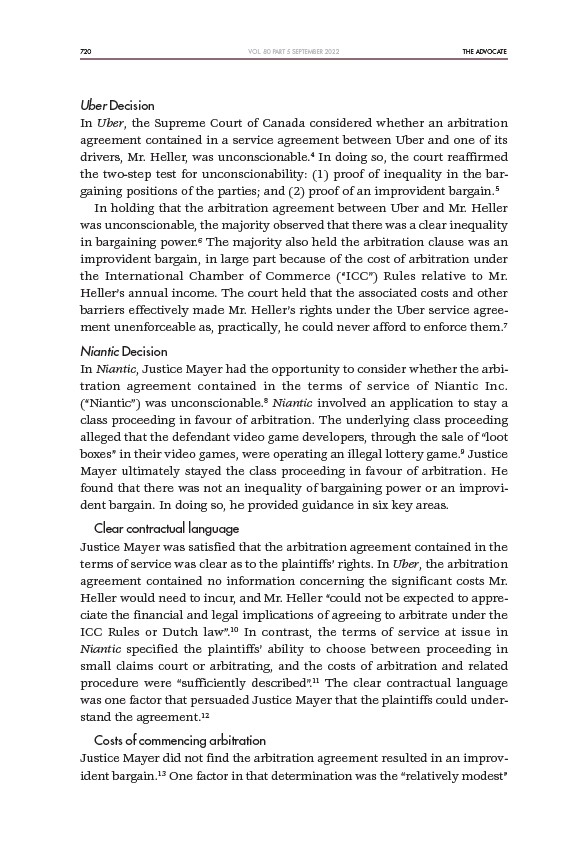
720 THE ADVOCATE
VOL. 80 PART 5 SEPTEMBER 2022
Uber Decision
In Uber, the Supreme Court of Canada considered whether an arbitration
agreement contained in a service agreement between Uber and one of its
drivers, Mr. Heller, was unconscionable.4 In doing so, the court reaffirmed
the two-step test for unconscionability: (1) proof of inequality in the bargaining
positions of the parties; and (2) proof of an improvident bargain.5
In holding that the arbitration agreement between Uber and Mr. Heller
was unconscionable, the majority observed that there was a clear inequality
in bargaining power.6 The majority also held the arbitration clause was an
improvident bargain, in large part because of the cost of arbitration under
the International Chamber of Commerce (“ICC”) Rules relative to Mr.
Heller’s annual income. The court held that the associated costs and other
barriers effectively made Mr. Heller’s rights under the Uber service agreement
unenforceable as, practically, he could never afford to enforce them.7
Niantic Decision
In Niantic, Justice Mayer had the opportunity to consider whether the arbitration
agreement contained in the terms of service of Niantic Inc.
(“Niantic”) was unconscionable.8 Niantic involved an application to stay a
class proceeding in favour of arbitration. The underlying class proceeding
alleged that the defendant video game developers, through the sale of “loot
boxes” in their video games, were operating an illegal lottery game.9 Justice
Mayer ultimately stayed the class proceeding in favour of arbitration. He
found that there was not an inequality of bargaining power or an improvident
bargain. In doing so, he provided guidance in six key areas.
Clear contractual language
Justice Mayer was satisfied that the arbitration agreement contained in the
terms of service was clear as to the plaintiffs’ rights. In Uber, the arbitration
agreement contained no information concerning the significant costs Mr.
Heller would need to incur, and Mr. Heller “could not be expected to appreciate
the financial and legal implications of agreeing to arbitrate under the
ICC Rules or Dutch law”.10 In contrast, the terms of service at issue in
Niantic specified the plaintiffs’ ability to choose between proceeding in
small claims court or arbitrating, and the costs of arbitration and related
procedure were “sufficiently described”.11 The clear contractual language
was one factor that persuaded Justice Mayer that the plaintiffs could understand
the agreement.12
Costs of commencing arbitration
Justice Mayer did not find the arbitration agreement resulted in an improvident
bargain.13 One factor in that determination was the “relatively modest”